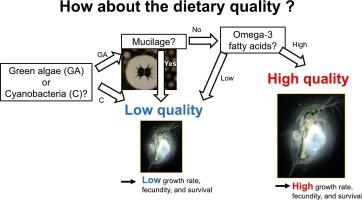Presence of mucilage and low omega-3 fatty acid contents in phytoplankton impair the quality of phytoplankton diet for zooplankton
IF 1.5
4区 环境科学与生态学
Q2 BIODIVERSITY CONSERVATION
引用次数: 0
Abstract
Phytoplankton are a crucial basal dietary source for consumers in lake ecosystems. The dietary quality of phytoplankton for zooplankton has been investigated in terms of molecules (e.g., fatty acids) and stoichiometry. However, little is known on the effects of algal mucilage on the dietary quality of phytoplankton. Therefore, this study aimed to investigate the effects of mucilage and fatty acid contents in phytoplankton on dietary quality. Zooplankton (Daphnia pulicaria) were reared with a single species of phytoplankton as the diet. Eighteen phytoplankton types were used. Algal dietary quality was evaluated based on the growth, reproduction, and survival rates of D. pulicaria for each dietary algal species during the feeding experiments. The results demonstrated that the dietary quality of phytoplankton with mucilage decreased significantly among the green algae. Green algae without mucilage had high omega-3 fatty acid contents, which increased its dietary quality. The quality of cyanobacteria diet was low for D. pulicaria regardless of the absence or presence of mucilage and fatty acid contents. The results show that the presence of mucilage may have reduced ingestion and digestion by zooplankton and indicate that this algal succession will have a negative impact on lake ecosystems.

浮游植物中的粘液和较低的ω-3 脂肪酸含量会影响浮游动物的浮游植物食物质量
浮游植物是湖泊生态系统中消费者的重要基础食物来源。浮游植物对浮游动物的食物质量已从分子(如脂肪酸)和化学计量学方面进行了研究。然而,人们对藻类粘液对浮游植物食物质量的影响知之甚少。因此,本研究旨在调查浮游植物中的粘液和脂肪酸含量对食物质量的影响。以单一种类的浮游植物为食物饲养浮游动物(水蚤)。共使用了 18 种浮游植物。藻类食物质量的评估基于喂养实验中每种食物藻类对水蚤的生长、繁殖和存活率。结果表明,在绿藻中,含有粘液的浮游植物的食物质量明显下降。不含粘液的绿藻具有较高的ω-3脂肪酸含量,从而提高了其食物质量。对于 D. pulicaria 而言,无论是否含有粘液和脂肪酸含量,蓝藻的食物质量都很低。结果表明,粘液的存在可能会减少浮游动物的摄食和消化,并表明这种藻类演替将对湖泊生态系统产生负面影响。
本文章由计算机程序翻译,如有差异,请以英文原文为准。
求助全文
约1分钟内获得全文
求助全文

 求助内容:
求助内容: 应助结果提醒方式:
应助结果提醒方式:


